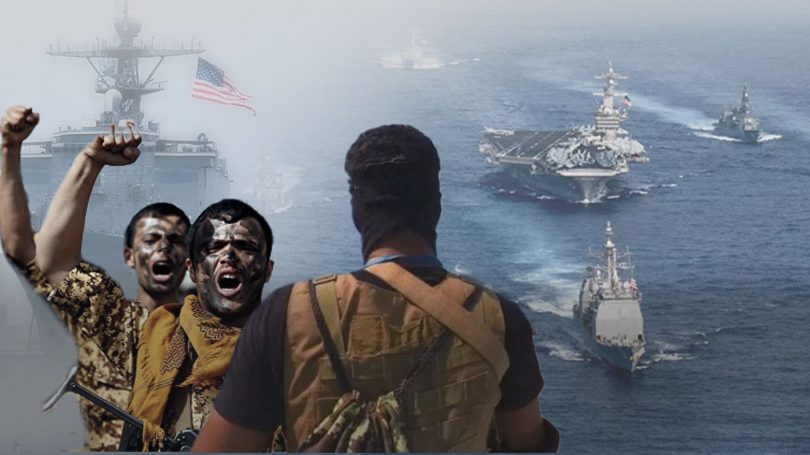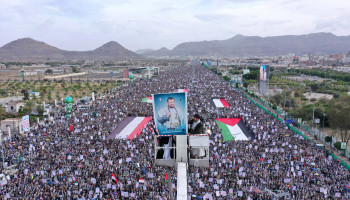A year has passed since Sana’a declared the launch of the “Promised Conquest and Sacred Jihad” in solidarity with the Palestinian people. Across every measure of deterrence, gains, and capabilities, the Western-Zionist alliance—having mobilized its full power and influence to crush Yemen’s support front—stands empty-handed and far from achieving even a fraction of its announced goals. Surrounded by clear acknowledgments of utter failure, this alliance has neither lifted Yemen’s naval blockade on the enemy entity nor weakened Yemen’s military strength or leadership decisions. In stark contrast, Yemen’s national leadership stands firm with a record of unprecedented, barrier-breaking achievements, defying the desires of the enemy and its regional and international partners. The prospect of escalation to mask this defeat grows dimmer, as neither media nor military strategies appear sufficient to reverse the situation.
A report published Friday by the American site Energy Intelligence, an authority on energy information, stated that U.S. B-2 stealth bomber strikes on Yemen failed to impact Yemeni operations, whether on the maritime front or in occupied Palestinian territories. On the contrary, Yemeni operations reportedly intensified through October.
The report quoted Jakob Larsen, Head of Maritime Security at BIMCO, who pointed out that insurance premiums for ships vulnerable to attacks continue to rise. He added, “If the current situation becomes normalized, ships that meet Houthi requirements will be more competitive than others.” This referred to ships unassociated with the enemy, the United States, or the United Kingdom, and companies compliant with the blockade. In contrast, he emphasized that “this will affect shipowners tied to Israel, the United States, and the United Kingdom.”
This statement further confirms the Yemeni Armed Forces’ success in asserting unmatched control over the extensive maritime operational area. Such acknowledgment arrives after a year of concerted Western attempts, led by the United States, to end Yemeni operations through naval deployments, aggressive airstrikes, and political and economic pressures—ultimately reflecting a failure too substantial to ignore.
Numerous analysts cited by Energy Intelligence confirmed that Yemeni operations “will continue despite the airstrikes by the United States, the United Kingdom, and Israel.”
Adding to this, the report cited Dina Arakji, an analyst in "Control Risks", who observed that the Yemeni Armed Forces “have, over nearly a decade, grown more resilient against foreign airstrikes, learning to endure and regroup throughout the Saudi-led coalition’s sustained aerial campaigns from 2015 to 2022.”
The report also referenced Martin Kelly, Senior Middle East Analyst at maritime risk consulting firm EOS Risk Group, who said, “During the war with the Saudi-led coalition, the Houthis could sometimes respond to airstrikes within hours, even after numerous coalition attacks.” He added that Yemeni forces are “highly mobile, with anti-ship missile launchers and drones that can easily be moved out of sight before any military aircraft are deployed.”
Kelly noted that the recent U.S. B-2 stealth bomber strike last month had no impact.
The report highlighted the recent unveiling by the Yemeni Armed Forces of the “Al-Qari’a” underwater drone. Kelly commented that “detecting and defending against these submarines is significantly harder,” noting that this underwater drone “can carry a 40-kilogram warhead, potentially disabling ships if struck from the rear.”
The report quoted Aran Kennedy, a researcher at Control Risks, who remarked that “if unmanned underwater vehicles are widely deployed, it will mark a significant tactical advancement for the Houthis.” He added that defending any ship from a “dual submarine and drone attack” would be exceedingly difficult for traditional naval missions.
These expert testimonies from the West underscore a year of complete failure by U.S., European, and Zionist forces in limiting Yemen’s support operations. This failure spans temporal and geographical boundaries, resulting in lasting geopolitical shifts. The region’s maritime dominance cannot return to its previous status, as Yemeni forces have managed to neutralize Western fleets and enforce a blockade over navigation in the area. This degree of failure amounts to a “defeat,” according to a new report by The Telegraph, which stated last Thursday that the situation in the Red Sea “constitutes an embarrassment for NATO at present.”
The newspaper pointed out that Yemen has “exposed decades of resource shortfalls in Western naval forces, compounded by flawed strategy and an inability to coordinate fundamental operational and tactical maritime activities among various groups,” adding that Russia and China are observing this failure closely in the Red Sea.
The Western failure against Yemen’s support front over the past year has not been limited to halting operations or influencing decisions. It has also failed to curb the expanding regional impact of this active front. The Wall Street Journal reported last week that those it referred to as “the Houthis” have become a “global” movement, rapidly expanding abroad and building international connections with actors across the Middle East, Africa, and even distant regions such as Russia, according to Western officials cited by the paper.
The report quoted U.S. envoy to Yemen Tim Lenderking, who stated, “One unfortunate extension of the Gaza conflict is that the Houthis have increased their contacts with other actors in the region and beyond,” describing this trend as “very concerning.” He added that “the United States is consulting with regional partners on how to manage this.”
In light of all these statements, it is clear that Yemen’s support front for Gaza has, within a year, placed the entire Zionist enemy front in an challenging position, unable to shift strategic dynamics or create significant impact. This outcome is both humiliating and revealing for the enemy, who historically relied on narratives of dominance, deterrence, military decisiveness, and invincible influence. These narratives have collapsed, leaving only the stark reality of extended failure—from the vast maritime operations to the heart of occupied Palestinian territories, touching even diplomatic and regional political arenas.
While the enemy seeks new routes of escalation to circumvent this stark reality, as suggested by Lenderking, all calculations appear unfavorable. Over the past year, Sana’a has consistently achieved decisive gains and asserted dominance. Revolution Leader Sayyid Abdul-Malik Badruldeen al-Houthi reinforced this by affirming full preparedness to confront any level of escalation, signaling a readiness for decisive action if necessary.







